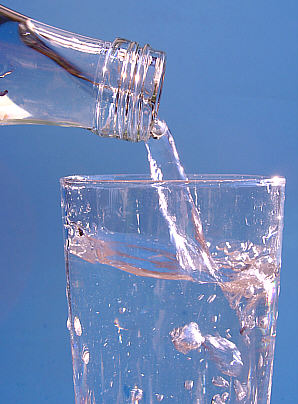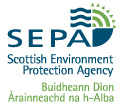
The Wildlife and Countryside Act 1981 is an Act of Parliament in the United Kingdom implemented to comply with European Council Directive 79/409/EEC on the conservation of wild birds. In short, the act gives protection to native species, controls the release of non-native species, enhances the protection of Sites of Special Scientific Interest and builds upon the rights of way rules in the National Parks and Access to the Countryside Act 1949. The Act is split into 4 parts covering 74 sections; it also includes 17 schedules.

Drinking water or potable water is water that is safe for ingestion, either when drunk directly in liquid form or consumed indirectly through food preparation. It is often supplied through taps, in that case, it is also called tap water. Typically in developed countries, tap water meets drinking water quality standards, even though only a small proportion is actually consumed or used in food preparation. Other typical uses for tap water include washing, toilets, and irrigation. Greywater may also be used for toilets or irrigation. Its use for irrigation however may be associated with risks.

The Department for Environment, Food and Rural Affairs (Defra) is a ministerial department of the Government of the United Kingdom. It is responsible for environmental protection, food production and standards, agriculture, fisheries and rural communities in the entire United Kingdom. Concordats set out agreed frameworks for co operation, between it and the Scottish Government, Welsh Government and Northern Ireland Executive, which have devolved responsibilities for these matters in their respective nations.

Bottled water is drinking water packaged in plastic or glass water bottles. Bottled water may be carbonated or not, with packaging sizes ranging from small single serving bottles to large carboys for water coolers. The consumption of bottled water is influenced by factors such as convenience, taste, perceived safety, and concerns over the quality of municipal tap water. Concerns about the environmental impact of bottled water, including the production and disposal of plastic bottles, have led to calls for more sustainable practices in the industry.
The Environment Agency (EA) is a non-departmental public body, established in 1996 and sponsored by the United Kingdom government's Department for Environment, Food and Rural Affairs, with responsibilities relating to the protection and enhancement of the environment in England.

The water industry provides drinking water and wastewater services to residential, commercial, and industrial sectors of the economy. Typically public utilities operate water supply networks. The water industry does not include manufacturers and suppliers of bottled water, which is part of the beverage production and belongs to the food sector.

The Scottish Environment Protection Agency is Scotland's environmental regulator and national flood forecasting, flood warning and strategic flood risk management authority. Its main role is to protect and improve Scotland's environment. SEPA does this by helping business and industry to understand their environmental responsibilities, enabling customers to comply with legislation and good practice and to realise the economic benefits of good environmental practice. One of the ways SEPA does this is through the NetRegs environmental guidance service. It protects communities by regulating activities that can cause harmful pollution and by monitoring the quality of Scotland's air, land and water. The regulations it implements also cover the storage, transport and disposal of radioactive materials.

The Environmental Protection Act 1990 is an Act of the Parliament of the United Kingdom that as of 2008 defines, within England and Wales and Scotland, the fundamental structure and authority for waste management and control of emissions into the environment.
Various energy conservation measures are taken in the United Kingdom.
Water supply and sanitation in France is universal and of good quality. Salient features of the sector compared to other developed countries are the high degree of private sector participation using concession and lease contracts and the existence of basin agencies that levy fees on utilities in order to finance environmental investments. Water losses in France (26%) are high compared to England (19%) and Germany (7%).
Public water supply and sanitation in the United Kingdom is characterised by universal access and generally good service quality. A salient feature of the sector in the United Kingdom compared to other developed countries is the diversity of institutional arrangements between the constituting parts of the UK, which are each described in separate articles, while this article is devoted to some common issues across the United Kingdom.
Water supply and sanitation (WSS) in the European Union (EU) is the responsibility of each member state, but in the 21st century union-wide policies have come into effect. Water resources are limited and supply and sanitation systems are under pressure from urbanisation and climate change. Indeed, the stakes are high as the European Environmental Agency found that one European out of ten already suffers a situation of water scarcity and the IEA measured the energy consumption of the water sector to be equivalent to 3,5% of the electricity consumption of the EU.
Environmental Quality is a set of properties and characteristics of the environment, either generalized or local, as they impinge on human beings and other organisms. It is a measure of the condition of an environment relative to the requirements of one or more species, any human need or purpose.
The Water supply and sanitation services in Portugal have seen important advances in access to services, technologies used and service quality over the past decades (1980s–1990s), partially achieved thanks to important funds from the European Union. Nevertheless, sanitation still remains relatively low in mountain rural areas and some people have their own sources of water controlled by municipalities.
Public water supply and sanitation in Denmark is characterized by universal access and generally good service quality. Some important features of the sector in Denmark as compared to other developed countries are:
Water supply and sanitation services in Ireland are governed primarily by the Water Services Acts of 2007 to 2014 and regulated by the Commission for Energy Regulation. Until 2015, the relevant legislation provided for the provision of water and wastewater services by local authorities in Ireland, with domestic usage funded indirectly through central taxation, and non-domestic usage funded via local authority rates. From 2015, the legislation provided for the setup of a utility company, Irish Water, which would be responsible for providing water and wastewater services, and funded through direct billing. The transition between these models, and certain aspects of operation of the new company, caused controversy in its initial period of operation.

Public water supply and sanitation in England and Wales has been characterised by universal access and generally good service quality. In both England and Wales, water companies became privatised in 1989, although Dwr Cymru operates as a not-for-profit organisation. Whilst independent assessments place the cost of water provision in Wales and England as higher than most major countries in the EU between 1989 and 2005, the government body responsible for water regulation, together with the water companies, have claimed improvements in service quality during that period.

Agriculture in the United Kingdom uses 69% of the country's land area, employs 1% of its workforce and contributes 0.5% of its gross value added. The UK currently produces about 54% of its domestic food consumption.
The Drinking Water Directive 2020 is an EU law that protects the quality of drinking water and forms part of the regulation of water supply and sanitation in the European Union.

Fracking in the United Kingdom started in the late 1970s with fracturing of the conventional oil and gas fields near the North Sea. It was used in about 200 British onshore oil and gas wells from the early 1980s. The technique attracted attention after licences use were awarded for onshore shale gas exploration in 2008. The topic received considerable public debate on environmental grounds, with a 2019 high court ruling ultimately banning the process. The two remaining high-volume fracturing wells were supposed to be plugged and decommissioned in 2022.









